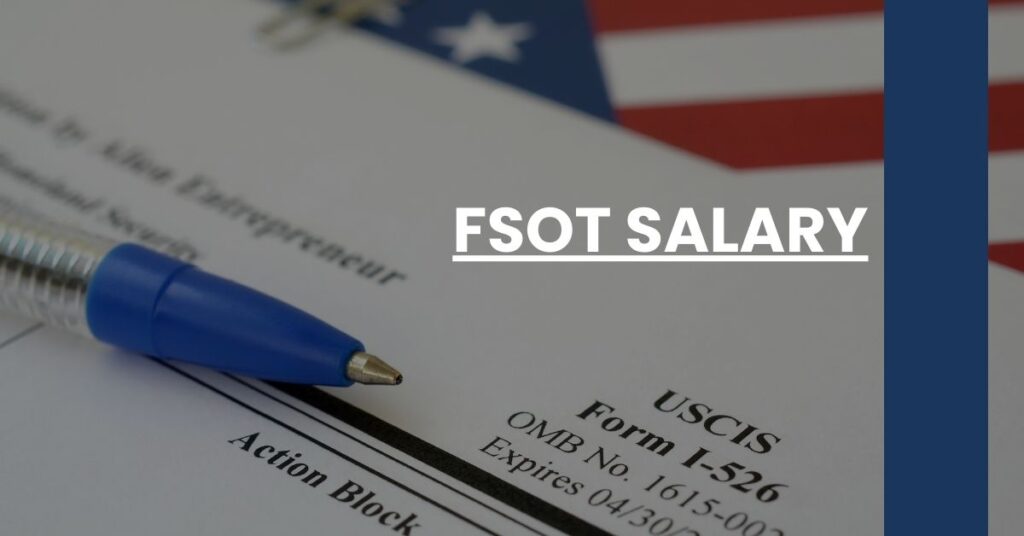An FSOT salary serves as the financial cornerstone for a career as a Foreign Service Officer, starting from $45,290 to $132,354 annually, and varies widely based on factors like education, experience, and international post.
Wondering about starting pay or how salaries progress? This information-packed article lays it all out, including base pay, increases from promotions, and additional compensation for challenging posts, such as Danger Pay and Cost-of-Living Adjustments.
If maximizing your earning potential piques your interest, we’ve got insights on bonuses for language skills and volunteering for specialized assignments. Read on for a clearer picture of the financial rewards in store for those pursuing this prestigious career path.
- Introduction to the Foreign Service Officer Test (FSOT)
- Basic Salary Structure of Foreign Service Officers
- Starting Salaries for Foreign Service Officers
- Over Time – The Foreign Service Officer Pay Raise System
- Additional Pay: Danger Pay and Post Differentials
- Cost-of-Living Allowance (COLA) for FSOs
- Other Benefits and Allowances for Foreign Service Officers
- Factors Influencing FSOT Salaries
- Career Progression and Salary Increases
- Comparing FSOT Salaries to Other Government Scales
- Maximizing Your Earning Potential as a Foreign Service Officer
- Conclusion: Assessing the Full Value of Foreign Service Work
Introduction to the Foreign Service Officer Test (FSOT)
If you’re eyeing a dynamic and impactful career in diplomacy, becoming a Foreign Service Officer (FSO) might be your calling. Before embarking on this prestigious path, you’ll need to conquer the Foreign Service Officer Test (FSOT) – a critical hurdle in the journey to joining the ranks of U.S. diplomats. The FSOT is a comprehensive assessment evaluating your knowledge and skills in areas such as American government, history, economics, world affairs, and communication.
Taking the FSOT is just the beginning. Passing the exam grants you the possibility to enter the A-100 orientation class, after which, if successful, you’ll start your career as an FSO with a starting salary that can vary depending on several factors. Understanding the complexities of the FSOT salary structure is key in setting realistic expectations for your potential earnings and career trajectory.
Basic Salary Structure of Foreign Service Officers
When you take a closer look at the sought-after FSOT salary, you’ll notice it follows a structured pay scale similar to other U.S. government roles. The base salary for FSOs is determined by grade levels ranging from FP-06 to FP-04, reflecting different stages and responsibilities within the Foreign Service career path.
As an FSO, your pay scale will be aligned with positions inside the U.S. that require similar skills, experience, and responsibilities. It’s structured to ensure equitability and fairness, considering the diverse duties and locales that come with the territory of international service.
Starting Salaries for Foreign Service Officers
So, what can you expect to pocket once you’ve joined the ranks? Your starting FSOT salary hinges on a combination of your educational background, professional experience, and the position for which you qualify. Naturally, higher educational attainments and extensive relevant experience can nudge you towards a more favorable starting point on the pay scale.
Entering the Foreign Service at the FP-06 through FP-04 levels, you’ll find that your base salary sets the stage for what is a competitive compensation package when combined with the various allowances and benefits earned while posted abroad. This initial salary is just your starting line – as your career in the Foreign Service progresses, so too does your earning potential.
Over Time – The Foreign Service Officer Pay Raise System
In the realm of the Foreign Service, your dedication and service do not go unrewarded. As you gain experience, demonstrate proficiency in critical languages, and excel in challenging posts, your FSOT salary is primed for growth.
You’ll find opportunities for increases both through structured time-in-service raises and promotion to higher pay grades. Standout performances and demonstrating the capacity to handle complex assignments can pave the way for more rapid salary escalations, marking not just an increase in responsibility but also a nod to your value as an integral part of U.S. diplomacy.
Additional Pay: Danger Pay and Post Differentials
Your adventure as an FSO might take you to far-flung corners of the globe, sometimes to areas with heightened risks or living costs. If your assignment leads you to such a locale, your base FSOT salary could be supplemented with Danger Pay or Post Differentials.
Danger Pay: You might be eligible for this incentive if stationed in a location with precarious conditions or security issues that go beyond the everyday occupational hazards.
Post Differential: Imagine grappling with a cost of living that’s through the roof or dealing with exceptionally difficult or unhealthy conditions. A Post Differential is there to offer relief in the form of additional pay, making your endeavor all the more sustainable.
These incentives are designed to fairly compensate you for the sacrifices made in the pursuit of supporting and advancing U.S. interests and policies abroad.
Cost-of-Living Allowance (COLA) for FSOs
When living abroad, the economic landscape can shift dramatically from one assignment to the next. That’s where the Cost-of-Living Allowance (COLA) kicks in, adjusting your FSOT salary to match the relative cost difference between your post and Washington, D.C.
COLA is pivotal in maintaining your living standard, especially in cities where your dollars don’t stretch as far. Whether it’s Tokyo’s towering real estate market or Geneva’s pricey groceries, this allowance works to level the financial field, allowing you to focus on your diplomatic duties without undue financial worry.
Understanding the breadth of compensation available to Foreign Service Officers, it’s clear that while the FSOT salary is a core component, it’s by no means the full financial picture. Let’s further explore the rich tapestry of benefits and allowances that complement your base pay, ensuring a comprehensive package that acknowledges the unique challenges FSOs face.
Other Benefits and Allowances for Foreign Service Officers
As you navigate the intricacies of fsot salary and compensation, it’s important not to overlook the additional benefits and allowances that can significantly enhance your remuneration package. These extras are designed to offset the costs of living overseas and other aspects of Foreign Service life, making the entire proposition financially appealing.
Housing and Utilities: One of the most substantial benefits is the housing allowance. While posted abroad, you likely won’t have to worry about rent or utilities, as the U.S. government often provides this.
Education: If you have children, their education can be a major concern. The education allowance covers certain costs of schooling overseas, ensuring they receive quality education no matter where you’re stationed.
Travel: Another perk is the travel allowance. You can expect the government to cover travel costs for you and your dependents during relocation, providing a smooth transition to your new post.
Aside from these, comprehensive health insurance, generous leave policies, and retirement benefits form a safety net that protects you and your family throughout your career as an FSO and beyond.
Each of these benefits is more than an additive to your fsot salary; they represent the government’s investment in your well-being and professional development. For more detailed information on what you can expect, Path to Foreign Service offers a wealth of resources.
Factors Influencing FSOT Salaries
The base fsot salary is far from fixed and can be swayed by a variety of factors that highlight your unique skills and circumstances. For instance, your geographic location has a substantial impact. Serving in cities with a higher cost of living will typically offset with increased allowances. Likewise, proficiency in a highly-demanded foreign language or taking specialized assignments may also bump up your pay.
When considering an FSO career, reflect on these elements that can influence your compensation. By strategically developing language skills and being open to diverse assignments, you can position yourself for an advantageous salary trajectory.
Career Progression and Salary Increases
As with many careers, your dedication and commitment as a Foreign Service Officer have the potential to fuel a rewarding journey up the ranks. Each promotion brings with it not only a sense of personal achievement but also tangible financial benefits. While the fsot salary serves as a foundation, ascending through the ranks from Junior Officer to Senior Foreign Service status comes with considerable salary leaps.
The progression typically follows a pattern of promotions, with time-in-grade requirements and performance evaluations dictating the pace. This ladder of opportunity rewards those who demonstrate exemplary service, intellectual rigor, and adaptability—a recognition that goes beyond monetary value.
In plotting your career course, be aware that while advancement is merit-based, there are also structured opportunities for salary increases that align with your growing expertise and experience.
Comparing FSOT Salaries to Other Government Scales
When you place the fsot salary alongside other U.S. government pay scales, such as the General Schedule (GS) for civil service employees or military compensation packages, the competitive nature of FSO remuneration becomes evident. What sets the Foreign Service apart is the combination of base salary with overseas allowances and benefits that can result in a higher net income.
Understanding these comparisons can provide insights into the financial proposition of a Foreign Service career. It allows you to recognize the comprehensive value offered to those who undertake this globally-oriented service.
Maximizing Your Earning Potential as a Foreign Service Officer
So, how can you boost your fsot salary and benefits package? Here are a few strategies:
- Skill Enhancement: Specialize in a critical needs language or in-demand skill that can result in eligibility for additional bonuses.
- Hardship Posts: Volunteer for hardship posts where you not only gain valuable experience but often receive financial incentives as well.
- Performance: Consistently deliver strong performance and seek leadership roles—these factors can hasten promotion and the associated pay increases.
By proactively managing your career, maintaining flexibility, and capitalizing on the opportunities presented, you can significantly impact your earning potential. More details on how to increase your financial rewards as a Foreign Service Officer can be found on the insightful Path to Foreign Service website.
Conclusion: Assessing the Full Value of Foreign Service Work
As we wrap up our exploration of the fsot salary, it’s important to recognize that your compensation as a Foreign Service Officer comprises much more than just a paycheck. It’s a complete package that includes diverse benefits, allowances, opportunities for career advancement, and the intangible rewards that come with representing your country and making a global impact.
The full value of this career cannot be measured in dollars alone; it’s also found in the experiences gained, the lives touched, and the growth both personal and professional that comes with this remarkable line of work. Whether you’re just starting out or are looking to maximize your career potential, the financial rewards of the Foreign Service are clearly substantial—and they’re only one part of what makes this path truly worthwhile.
FSOT salary insights for aspiring Foreign Service Officers, including pay scales, benefits, and factors affecting earnings potential.

